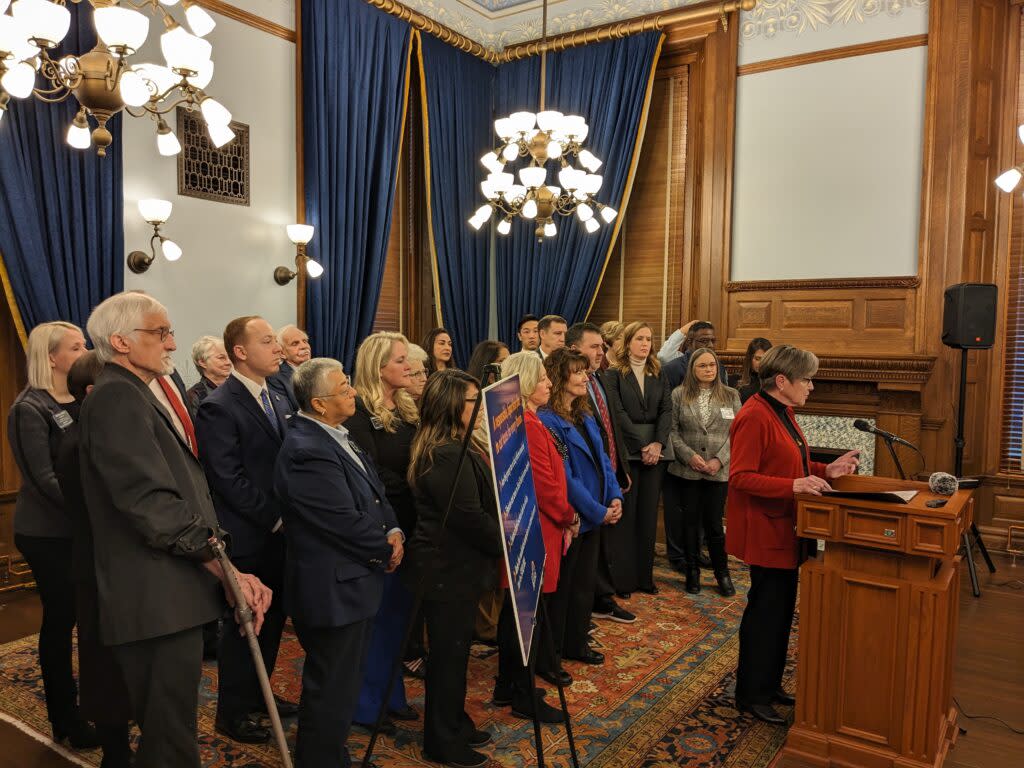Gov. Laura Kelly not ready to declare date of Kansas’ special legislative session on tax policy

- Oops!Something went wrong.Please try again later.
Gov. Laura Kelly launched the 2024 legislative session by revealing a bipartisan tax reform package in January. After Kelly vetoed three major tax bills, the Kansas Legislature is headed for a not-yet-scheduled special session in June to resolve gridlock on tax reform. (Tim Carpenter/Kansas Reflector)
TOPEKA — Gov. Laura Kelly didn’t meet a self-imposed deadline for announcing the date of a special session of the Kansas Legislature to seek an elusive compromise on a package of major sales, income and property tax reforms.
Legislative factions and the Democratic governor have struggled since January to piece together a bill reducing the tax burden without raising the risk of exhausting the state’s cash surplus and plummeting state government into a budget quagmire.
“Governor Kelly plans to announce the date of a special session soon,” said Grace Hoge, a Kelly spokeswoman, on Tuesday. “Although Governor Kelly anticipated announcing the date of a special legislative session last week, she continues to have ongoing conversations with legislative leaders about the availability of their caucuses in order to determine the best date.”
Throughout the 2024 legislative session, Kelly met with Republican House and Senate leaders to share her views of proposed tax legislation. That type of conversation was expected to continue ahead of the special session to narrow divisions centered on the overall cost of tax reform.
Kelly vetoed three massive bills combining income, sales and property tax reductions since the session began in January. She warned Senate President Ty Masterson, R-Andover, and House Speaker Dan Hawkins, R-Wichita, that she would reject “unsustainable” bills even if gridlock led to a special session.
“We can deliver comprehensive, sustainable tax cuts,” Kelly said in a veto message. “If we all work together, an affordable, bipartisan tax plan can be passed in less than a day.”
The entire Legislature — all 125 House seats and the 40 Senate seats — will be up for grabs in the August primary and November general election. Time devoted to debate on tax reform during the special session pulled candidates away from the campaign trail and interfered with fundraising.
If the Legislature succeeded in repackaging the most-recently vetoed Senate Bill 37, House Bill 2096 and House Bill 2097 during the special session rather than pursue compromise, a report from the state budget division said the treasury could end up with a $488 million deficit in four years and a $1.3 billion deficit in five years.
GOP lawmakers have argued proposed reductions in revenue wouldn’t damage the state budget.
Business of taxes
During the past month, a coalition of 15 Kansas business organizations as well as a business-friendly think tank in Washington, D.C., applied pressure on the governor and others to dedicate themselves to compromise during the not-yet-scheduled special session.
In a May 22 letter to Kelly, a coalition that included the Kansas Chamber, Kansas Farm Bureau and several construction and agriculture lobbying groups asked the Democratic governor to not let property and sales tax changes slip through her fingers if an agreement on divisive individual income tax rate reductions couldn’t be reached during the special session.
Signers of the letter were convinced “broad-based” property tax relief coupled with repeal of the state income tax on Social Security benefits, elimination July 1 of the state’s 2% sales tax on groceries and linking banking taxes with corporate tax rates would “enjoy strong, bipartisan support among legislators.”
The sticky politics and economics of lowering the state’s personal income tax rates shouldn’t be allowed to undermine other good tax policy, the letter said.
“Under this approach,” the business groups said, “money would remain available to you and the Legislature to pursue income tax relief, whether that occurs during the special session or the next session” in 2025.
Kelly told legislators she wouldn’t sign tax-cut bills that would drive the budget into the ditch in the manner that occurred after GOP Gov. Sam Brownback signed a bill in 2012 aggressively reducing state income taxes, especially for businesses. The loss of state revenue led to cuts in core government services, prompted heavy borrowing and increased the state’s sales tax before Brownback’s policy was repealed in 2017.
A think tank view
The Tax Foundation, a Washington think tank devoted to reducing business taxes and a target of criticism by progressives, published guidance for Kansas lawmakers that concluded the state was “long overdue” for tax changes capable of promoting economic growth.
Katherine Loughead, Tax Foundation senior policy analyst and research manager, said Kansas sat idly since 2021 while 26 states cut individual income tax rates. Across the United States, she said, the median top marginal rate dropped to 5.12%, but Kansas maintained a rate of 5.7%.
She argued Kansas could afford to invest in tax reform because state revenue forecasters predicted the state could end the current fiscal year in June with a $2.6 billion budget surplus in addition to a $1.7 billion rainy-day fund.
“Of the tax changes that were vetoed, reductions to the top marginal individual income tax rate would provide the most bang for the buck in terms of promoting long-run economic growth and competitiveness,” Loughead said.
She said proposals to pair income tax rate reductions with increases in the personal exemption would meet the “pro-growth” model while delivering tax relief to low- and middle-income Kansans.
Removal of Social Security benefits from the state’s income tax base “would do little to promote economic growth and would exacerbate the discrepancy between the tax treatment of Social Security income and alternative forms of income,” she said.
“Narrowing the base in this way would make it more difficult to reduce the rates that apply to all taxable income, including wage income and all forms of taxable retirement income,” Loughead said.
The post Gov. Laura Kelly not ready to declare date of Kansas’ special legislative session on tax policy appeared first on Kansas Reflector.

